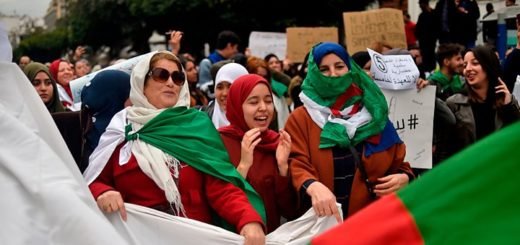Iraqis ready for parliamentary elections – Who are the Voters and Candidates
Iraqis head to the polls on Saturday for parliamentary elections.
After the ballot, the 329 members of parliament elected from party lists will be tasked with forming a government and electing a prime minister and president.
Following the 2003 US-led invasion and the fall of Saddam Hussein, Iraq held its first general election in January 2005, selecting a national assembly tasked with drafting a new constitution.

An Iraqi policeman guards a checkpoint by electoral posters in the old town of Mosul as the country prepares for parliamentary elections AFP / AHMAD AL-RUBAYE
It then held parliamentary elections in December 2005, with two subsequent polls in 2010 and 2014.
Here is what you need to know about Iraq’s 2018 parliamentary elections:
Voters
Nearly 24.5 million of Iraq’s roughly 38 million people are registered to vote. They are spread out across 18 provinces.
Voters can cast their ballots at 8,959 polling stations across the country, all of which are equipped for electronic voting.
According to Iraqi authorities, nearly 11 million biometric identity cards have been distributed to authenticate identities.
The 285,564 internal refugees eligible to vote can do so in one of 166 polling stations in 70 camps spread across eight provinces in the country.
Voters will select party lists and seats will be divided up according to the number of votes each list secures.
Polling for Iraq’s roughly one million security force personnel and the one million voters living abroad was held ahead of the main election day.
Candidates
There are 6,990 candidates, including 2,011 women, set to run in the polls.
They will be competing for 329 seats, including nine reserved for minorities — Christians, Shabaks, Yazidis, Mandeans and Fayli Kurds — and 83 for women.
Candidates, selected based on their position in the party, will be elected to four-year terms in parliament.
There are 87 party lists in this year’s election.
The main lists are as follows:
– VICTORY ALLIANCE, led by incumbent Prime Minister Haider al-Abadi.
This year, for the first time since the fall of Saddam Hussein in 2003, the ranks of the executed leader’s oldest opponents, the Shiite Dawa Party, are divided.
Abadi, a key figure in the Dawa Party, has put together a list composed largely of civil society personalities that cross sectarian lines.
– CONQUEST ALLIANCE, led by Hadi al-Ameri, head of the Badr organization and a leader of the mostly Shiite Hashed al-Shaabi paramilitary units, which played a key role in rolling back Islamic State (IS) group jihadists.
His candidates officially quit their military roles to run for office.
– RULE OF LAW ALLIANCE, led by former prime minister Nuri al-Maliki.
This list relies principally on the Dawa Party, which Maliki heads.
But while it is popular with public servants hired under his mandate, the list suffers from criticisms aimed at Maliki because IS seized one-third of the country under his watch.
– MARCHING TOWARDS REFORM, an unprecedented alliance between Shiite leader Moqtada Sadr and communists.
It includes mostly secular groups including the Iraqi Communist Party and Istiqama (Arabic for righteousness), a party of technocrats backed by Sadr, who suspended his Ahrar bloc and called on his 33 ministers not to run in the polls.
– Sunnis appear on several lists. The main list, “The National Alliance”, is led by Vice President Iyad Allawi — a Shiite who presents himself as secular — and Sunni head of parliament Salim al-Juburi.
Weakened after three years of IS rule, Sunnis could be the biggest losers in this year’s elections.
– KURDS will head to polls with divided ranks to fill their northern autonomous region’s 46 seats, two of which are reserved for Christians.
The main Kurdish parties are the Kurdistan Democratic Party (KDP) and the Kurdistan Patriotic Union (PUK).
There are also three opposition parties: the main Jamaa Islamiya, the newly created New Generation movement, and Goran (Kurdish for the change).
AFP
Irfan Ansari The Kootneeti Team - Middle East Monitor



















